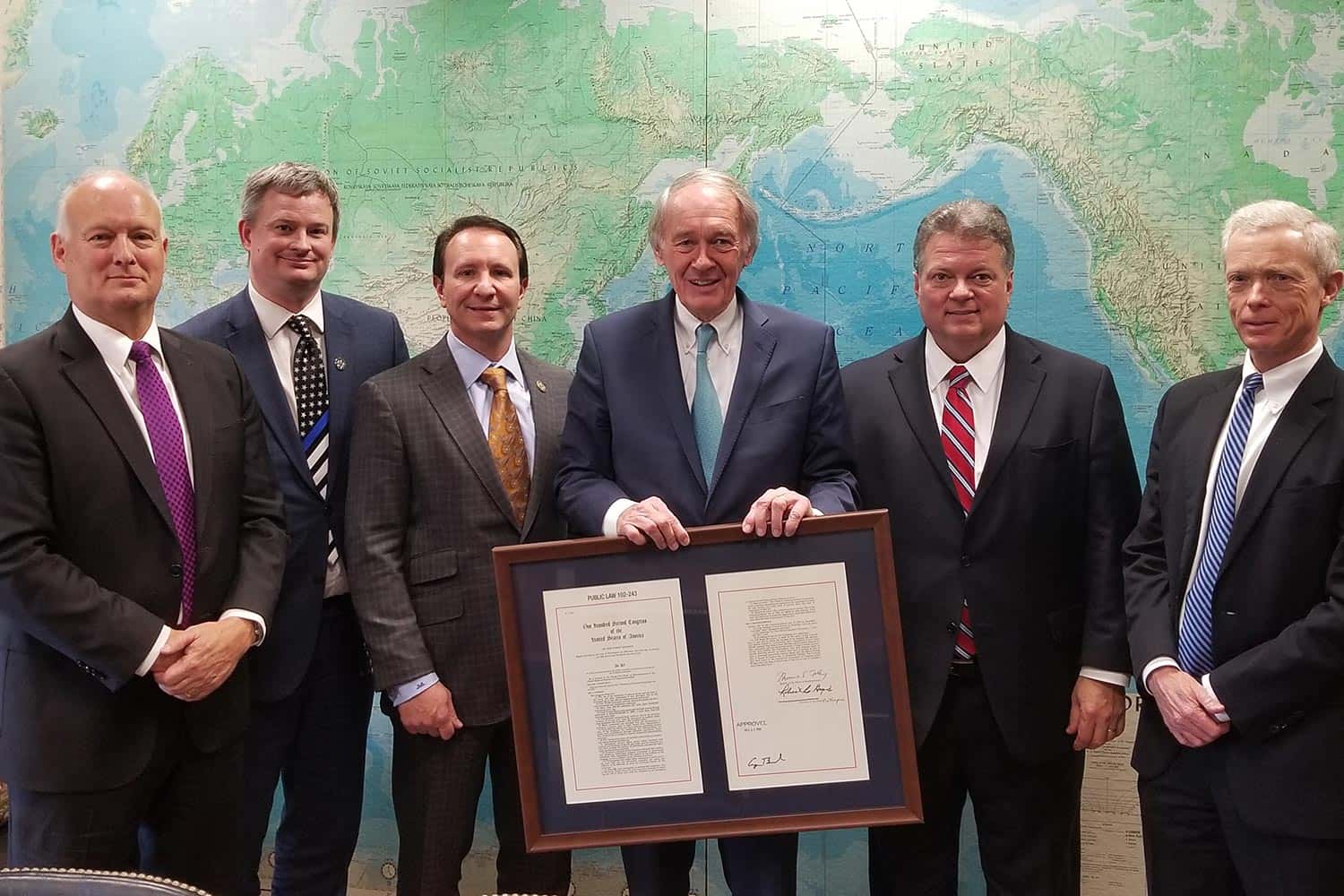NAAG Leads Successful Push to Repair the Crime Victims Fund
In August 2020, every attorney general in the country sent a letter to Congress asking for a number of reforms to stabilize the Crime Victims Fund. The Crime Victims Fund, which provides invaluable support to organizations supporting victims of crime and state victim compensation programs, has had a declining balance for a number of years.
Following the letter from the attorneys general, a bipartisan and bicameral coalition introduced the VOCA Fix to Sustain the Crime Victims Fund in March 2021. Within four months, the legislation passed the House of Representatives by a 384-38 margin, unanimously passed in the Senate, and was signed into law by President Biden in July. The reforms included in this law will provide invaluable support to crime victims throughout the country and will stabilize the Crime Victims Fund for years to come.
NAAG was represented at the signing ceremony at the White House by Maryland Attorney General Brian Frosh and Virginia Attorney General Mark Herring.
I was proud to join @POTUS for the signing of these important fixes to the Victims of Crime Act at the @WhiteHouse today.
— Mark Herring (@MarkHerringVA) July 22, 2021
The increased funding and flexibility for VOCA-funded programs will greatly benefit victims and their families in VA and provide more support and resources. pic.twitter.com/3uPAc5VLVv
Safeguarding America's First Responders Act of 2020
In May 2020, NAAG endorsed the Safeguarding America's First Responders Act of 2020. This legislation permits the families of first responders who die or are permanently and totally disabled as a result of COVID-19 to receive the same federal benefits extended to first responders, or their survivors, otherwise killed or injured in the line of duty. In short, the legislation ensures that families of officers and first responders lost while fighting the pandemic do not face unnecessary barriers to benefits by establishing a temporary presumption that COVID-19 infections will be considered to be contracted while on duty if diagnosed within 45 days of an officer’s last shift.
Just three months after 52 attorneys general joined NAAG's endorsement letter, the President signed the bill into law.
NAAG Efforts Push Pallone-Thune TRACED Act into Law
On March 5, 2019, 54 attorneys general sent a letter to the Senate Committee on Science, and Transportation endorsing the Pallone-Thune Telephone Robocall Abuse Criminal Enforcement and Deterrence (TRACED) Act [link to the bill]. The bill was signed into law later that year after passing both chambers.
Following the initial letter, several attorneys general met with the bill’s lead sponsors, Sens. Markey (D-MA) and Thune (R-SD).
In April 2019, Attorney General Peterson of Nebraska testified in support of the bill in front of the Senate Subcommittee on Communications, Technology, Innovation, and the Internet. Later that month, attorney general staff from North Carolina and Nebraska voiced their offices’ support for the bill while participating in a roundtable organized by Consumer Reports alongside Sen. Blumenthal (D-CT) and Rep. Jackie Speier (D-CA).
Since the bill was signed into law, NAAG staff and attorney general staff from the NAAG Robocall Working Group have been participating in the TRACED Act Interagency Robocall Working Group in coordination with officials from:

NAAG Helps Remove Barriers to Opioid Treatment
In March 2020, the Coronavirus Aid, Relief, and Economic Security (CARES) Act was signed into law. The legislation contained several elements previously supported by NAAG, including realigning privacy rules in 42 CFR Part 2 with HIPAA as recommended in NAAG’s June 2019 letter to Congress. The Department of Health and Human Services released the updated final rule changes for 42 CFR Part 2 in July 2020.
NAAG Helps Autism CARES Act Over the Finish Line
Following an endorsement letter signed by 47 attorneys general, the Autism Collaboration, Accountability, Research, Education, and Support (CARES) Act of 2019 passed and was signed into law within a month. This bipartisan law authorized $1.8 billion over five years to fund autism research, early detection, and treatment.
NAAG Propels Student Loan Discharges for Totally and Permanently Disabled Veterans Forward
Within three months of NAAG’s letter to Secretary of Education DeVos urging the Department of Education to take prompt action to satisfy its statutory mandate to discharge the student loans of veterans who are permanently and totally disabled or otherwise unemployable, the President issued a presidential memoranda directing the Secretary of Education to facilitate the discharge of federal student loan debt of totally and permanently disabled veterans.


